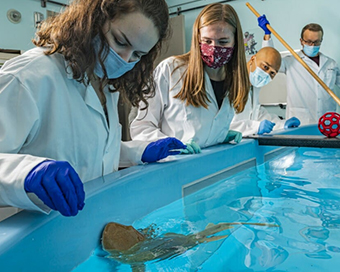Gallery
 PM Modi visit USA
PM Modi visit USA Only the mirror in my washroom and phone gallery see the crazy me : Sara Khan
Only the mirror in my washroom and phone gallery see the crazy me : Sara Khan Karnataka rain fury: Photos of flooded streets, uprooted trees
Karnataka rain fury: Photos of flooded streets, uprooted trees Cannes 2022: Deepika Padukone stuns at the French Riviera in Sabyasachi outfit
Cannes 2022: Deepika Padukone stuns at the French Riviera in Sabyasachi outfit Ranbir Kapoor And Alia Bhatt's Wedding Pics - Sealed With A Kiss
Ranbir Kapoor And Alia Bhatt's Wedding Pics - Sealed With A Kiss Oscars 2022: Every Academy Award Winner
Oscars 2022: Every Academy Award Winner Shane Warne (1969-2022): Australian cricket legend's life in pictures
Shane Warne (1969-2022): Australian cricket legend's life in pictures Photos: What Russia's invasion of Ukraine looks like on the ground
Photos: What Russia's invasion of Ukraine looks like on the ground Lata Mangeshkar (1929-2022): A pictorial tribute to the 'Nightingale of India'
Lata Mangeshkar (1929-2022): A pictorial tribute to the 'Nightingale of India' PM Modi unveils 216-feet tall Statue of Equality in Hyderabad (PHOTOS)
PM Modi unveils 216-feet tall Statue of Equality in Hyderabad (PHOTOS)The Badminton Association of India (BAI) has announced a 14-member-strong India squad for
- Men’s Sr Hockey Nationals to be played in division-based format from April 4
- Mensik denies Djokovic 100th title in Miami final
- KIPG: Son of a vegetable vendor, Bihar’s Jhandu Kumar eyes Worlds, 2028 Paralympics
- Hardik Singh credits hard work and team unity for receiving HI Midfielder of the Year award
- Djokovic, Alcaraz land in same half of Miami draw
Proteins taken from SHARK immune systems can prevent COVID-19 Last Updated : 17 Dec 2021 12:27:54 PM IST 
Small, unique antibody-like proteins derived from the immune systems of sharks can help prevent SARS-CoV-2, the virus that causes Covid-19, its variants, and related coronaviruses from infecting human cells, according to a new study.
The small proteins known as VNARs are one-tenth the size of human antibodies. But these can bind to infectious proteins in unique ways that bolster their ability to halt infection. The new class of drug is cheaper and easier to manufacture than human antibodies, and can be delivered into the body through various routes. However, it has yet to be tested in humans.Researchers from the University of Wisconsin-Madison showed that the VNARs were able to neutralise WIV1-CoV -- a coronavirus that is capable of infecting human cells, but currently circulates only in bats, where SARS-CoV-2 likely originated."The big issue is there are a number of coronaviruses that are poised for emergence in humans. What we're doing is preparing an arsenal of shark VNAR therapeutics that could be used down the road for future SARS outbreaks. It's a kind of insurance against the future," said Aaron LeBeau, Professor of pathology at the varsity."These small antibody-like proteins can get into nooks and crannies that human antibodies cannot access. They can form these very unique geometries. This allows them to recognise structures in proteins that our human antibodies cannot," LeBeau said. The team published its findings in the journal Nature Communications.In the study, the researchers tested the shark VNARs against both infectious SARS-CoV-2 and a "pseudotype," a version of the virus that can't replicate in cells.They identified three candidate VNARs from a pool of billions that effectively stopped the virus from infecting human cells. The three shark VNARs were also effective against SARS-CoV-1, which caused the first SARS outbreak in 2003.One VNAR, named 3B4, attached strongly to a groove on the viral spike protein near where the virus binds to human cells and appears to block this attachment process. This groove is very similar among genetically diverse coronaviruses, which even allows 3B4 to effectively neutralise the MERS virus, a distant cousin of the SARS viruses.The 3B4 binding site is also not changed in prominent variations of SARS-CoV-2, such as the delta variant. This research was conducted before the Omicron variant was discovered, but initial models suggest the VNAR would remain effective against this new variant, LeBeau said.The second-most-powerful shark VNAR, 2C02, seems to lock the spike protein into an inactive form. However, this VNAR's binding site is altered in some SARS-CoV-2 variants, which likely decreases its potency.Future therapies would likely include a cocktail of multiple shark VNARs to maximise their effectiveness against diverse and mutating viruses. LeBeau is also studying the ability of shark VNARs to help in the treatment and diagnosis of cancers.IANS New York For Latest Updates Please-
Join us on
Follow us on








172.31.16.186







